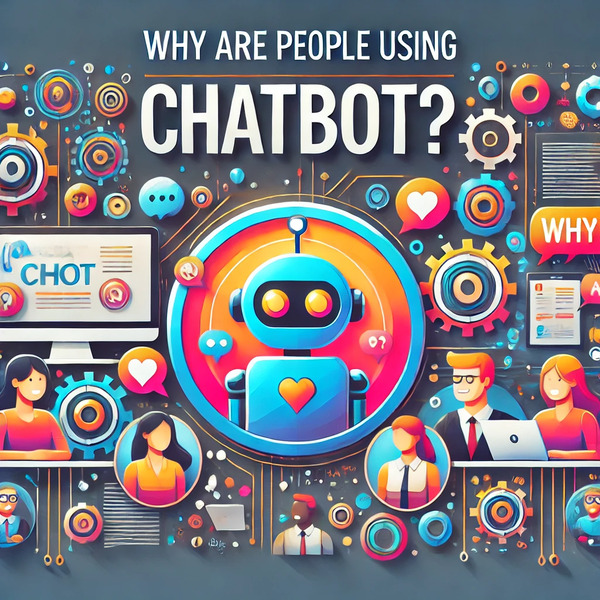Chatbots have become an integral part of our digital lives. Whether on websites, in mobile apps, or through messaging platforms, they are now commonplace. But why are so many people turning to chatbots? What makes these virtual assistants so appealing? Let’s explore the reasons behind their rapid rise in popularity.
Convenience and Instant Responses
In our fast-paced world, people are constantly looking for ways to save time. Chatbots cater to this need by offering instant responses. Whether you’re trying to order a pizza, check the weather, or resolve a customer service issue, chatbots are available 24/7 to assist. Unlike human agents, who may have long wait times or be unavailable during off-hours, chatbots provide immediate support. As a result, their use has become widespread, especially in businesses where quick, efficient responses are crucial.
Reduced Human Effort and Cost
From a business perspective, chatbots offer significant advantages. They can handle a high volume of repetitive tasks without the need for human intervention. This can save companies money by reducing the number of employees needed to handle routine queries. Chatbots can manage basic requests like checking account balances, resetting passwords, or booking appointments, freeing up human agents to focus on more complex issues. In comparison to human labor, chatbots are more cost-effective and provide a level of efficiency that helps businesses run smoothly.
Personalization and Tailored Experiences
Advancements in artificial intelligence (AI) have made chatbots increasingly capable of providing personalized experiences. They can track customer preferences and use that information to suggest products, services, or solutions that are most relevant. This level of personalization allows businesses to create more engaging interactions with their customers. Similarly, chatbots can adjust their tone and language depending on the user, making the conversation feel more natural. As a result, users are more likely to return to platforms where they feel understood and valued.
Availability and Accessibility
Another reason chatbots are gaining popularity is their accessibility. Whether you’re using a smartphone, a desktop, or even a smart speaker, chatbots can be integrated into almost any device or platform. This makes it easy for people to access assistance whenever they need it, no matter where they are. Additionally, chatbots are multilingual, making them an essential tool for companies with a global customer base. They can bridge language barriers, offering help in multiple languages without the need for a human translator.
Efficiency and Automation
Chatbots are excellent for automating processes. Instead of manually entering information or waiting for human intervention, chatbots can complete tasks automatically. For instance, when booking flights or making reservations, a chatbot can gather all necessary details, confirm the booking, and even send reminders to the user. This automation streamlines workflows, making tasks faster and reducing the likelihood of errors. For businesses, this means they can process more transactions or inquiries in a shorter amount of time.
Entertainment
Interestingly, chatbots are also being used in more personal and entertainment-based applications. One of the most popular trends in this area is the development of AI companions. These chatbots mimic relationships, offering companionship and emotional support. They are especially appealing to individuals who may feel isolated or seek a more imaginative way of interacting. People use these chatbots to engage in lighthearted, fun conversations or to explore deeper, more meaningful dialogues without judgment. The allure lies in the customization and fantasy element it offers, providing a unique, immersive experience. Additionally, AI chatbots are being integrated into fun activities like the Irish poker drinking game, offering interactive and engaging experiences.
AI Sexting and Intimate Interactions
Another area where chatbots are gaining traction is in more intimate interactions, specifically in the form of AI sexting. This refers to the use of AI chatbots to simulate intimate conversations, offering users a way to engage in private, adult content in a safe and controlled environment. AI-powered sexting platforms allow individuals to explore their desires or fantasies without the complexity of human relationships. However, this trend has sparked debates around the ethical implications and the psychological effects of using AI for intimate connections. Still, the popularity of these platforms continues to rise, with many people appreciating the sense of control and privacy they provide.
Improved Customer Support
Chatbots have revolutionized the way companies handle customer support. They can answer a wide range of queries, from product details to troubleshooting technical issues. Initially, customer service teams would have to manage each request individually, but with chatbots, they can delegate routine inquiries to the bot. As a result, response times are shortened, and human agents can focus on resolving more complex problems. In comparison to traditional customer service methods, chatbots offer a quicker, more efficient solution. This improvement in response time has led to increased customer satisfaction and loyalty.
The Role of Machine Learning
One of the most exciting developments in chatbot technology is the integration of machine learning. Over time, chatbots can learn from interactions and improve their responses. This means that as they gather more data, their ability to understand context and provide accurate information increases. This learning process allows chatbots to offer better, more relevant responses, which is especially important in customer service environments. Machine learning also enables chatbots to predict user needs based on past behavior, creating a more seamless and intuitive experience.
Privacy and Security
While some people may have concerns about data privacy when interacting with chatbots, advancements in AI technology have helped improve security measures. Most chatbot platforms use encryption to ensure that conversations remain private. Furthermore, these bots can be programmed to adhere to privacy regulations, ensuring that sensitive information is handled with care. However, it’s essential for users to be mindful of the information they share, especially in more intimate settings like AI sexting platforms, where privacy and discretion are paramount.
Social Interaction and Mental Health Support
In addition to entertainment and customer service, chatbots are increasingly being used for social interaction and mental health support. For example, some bots are designed to offer counseling or therapy-like interactions, helping individuals who may not have access to traditional mental health resources. These bots provide a safe, non-judgmental space for people to talk about their feelings, share their struggles, and receive advice. Although chatbots cannot replace human therapists, they can offer a first step for individuals seeking support. In particular, for those who are too embarrassed or unable to seek help in person, chatbot services can be an invaluable tool.
The Future of Chatbots
Looking forward, the future of chatbots appears bright. As AI continues to evolve, so will the capabilities of these virtual assistants. Chatbots will become more integrated into our daily lives, from shopping and banking to entertainment and health care. Their role will expand, and they will be able to offer even more personalized, intelligent services. However, it’s important to note that, while chatbots provide many benefits, they are not without their limitations. They cannot fully replace human interaction, and there will always be a need for human oversight, especially in areas such as customer service and mental health support.
Ultimately, chatbots are reshaping the way we interact with technology. From their ability to provide immediate assistance to their growing use in intimate and entertainment-based applications, people are embracing chatbots for their efficiency, convenience, and ability to personalize experiences. As AI continues to advance, we can expect chatbots to become even more integral to our lives, offering us new ways to communicate, learn, and engage with the world around us.



